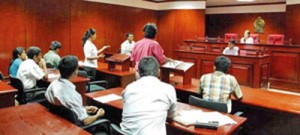A taste of APIIT Law School
The students waited with bated breath as their Lecturer illustrated on the board, a picture of a coconut palm and a girl in a flowery beach dress beneath it. The students were asked to imagine that they were survivors of a plane that had crashed in a remote part of the Pacific. They were also told that there were two hundred survivors and a great many resources and supplies they had with them were saved. However, there was much verbal and physical conflict when these islanders began living their own rules.
The class of thirty students were then randomly divided into three groups and were asked whether some kind of control was needed before the situation got worse.
They were given head gear representing various objects such as scrolls, fruits, crowns books and flowers. They were asked to create characters or leaders out of these.
They were asked to brainstorm as to what kind of rules or laws were needed and why? They had to design enforcement machinery and asked to outline a method of dealing with people who did not agree.
As brainstorming and role play continued there was discussion on how poverty, inequality and humiliation were interconnected. It was realised that there was a causal relationship between disadvantage and discord.
Students in their discussions emphasised that styles of communication and consultation were particularly important for the participation of marginalised and minority groups. They went on to say that if serious well intentioned with a strong sense for common good, leave the discussion or never join it, it creates an opportunity for others who may have narrow self seeking interests to step into the void.
It was also discussed about the active role that civil society has to play in political debate. It was hoped that by encouraging this kind of dialogue that ‘an empowered’ citizen would emerge gradually through local level debates around jobs, housing or other tangible issues and later have the independence and the required knowledge to engage with high level state processes.
It also transpired that for any society to create a common vision for itself, it was necessary to find a sense of belonging among all its members. The group suggested regular musical programmes open to all the islanders ending with a bring a dish barbeque on the beach.
More importantly the islanders had to have a Constitution that was created by them, for them and of them.
Sri Lankan Constitutional Experts who work with grassroots are rare and APIIT is determined to produce lawyers who will educate society on Constitutionalism, Good Governance and the Rule of Law. Public Law Teaching-should be more than text book based teaching. Last year a street-play entitled “Saamdesh” was organised by APIIT Law School to teach the public the rudiments of participatory Constitution Making.
APIIT believes in making Public Law teaching vibrant and interactive.
Quotations-from students who participated in the Desert Island activity spoke volumes:.
“We learnt to think how legislation could be formulated.”
“Although it was more common-sense than law –we learned to think as a team.”
“Great Programme. Learned about the Constitution in an interesting way.”
“It made us think of the WHOLE society. Such as disabled people and children.”
“It was a wonderful way of teaching us to think practically.”
“There was an amazing spirit of team work and hearing and respecting opinions of others and using all ideas in decision-making.”
Follow @timesonlinelk
comments powered by Disqus



















